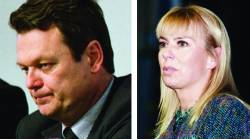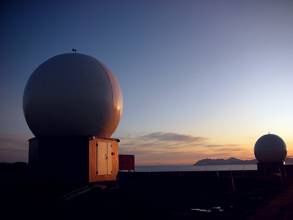 Carlo des Dorides, El?bieta Bie?kowska
Carlo des Dorides, El?bieta Bie?kowskaLast January, the European GNSS Agency (GSA) announced a new invitation to tender for the role of Galileo service operator (GSOp). Speaking at the recent EU Space Policy Conference in Brussels, GSA Executive Director Carlo des Dorides called it the largest contract ever to be awarded under the Galileo program.
“It will shape the future of Galileo,” he said.
Last January, the European GNSS Agency (GSA) announced a new invitation to tender for the role of Galileo service operator (GSOp). Speaking at the recent EU Space Policy Conference in Brussels, GSA Executive Director Carlo des Dorides called it the largest contract ever to be awarded under the Galileo program.
“It will shape the future of Galileo,” he said.
However, some highly placed members of the industrial community have expressed reservations about the plan, likening it to the failed public-private partnership (PPP) scheme that nearly shipwrecked the entire program less than 10 years ago.
Back then, the Galileo Joint Undertaking (GJU) was the program’s managing body, launched by the European Commission (EC) and the European Space Agency (ESA) in 2003. One of the GJU’s primary tasks was to negotiate PPP with members of the private sector.
In 2005, a consortium including Alcatel-Lucent, EADS, Finmeccanica, Inmarsat, and Thales emerged as the leading candidate, but by 2007, negotiations on the concession agreement had stalled, necessitating a complete rethink of Galileo financing, with the EC ultimately buying out the program, becoming sole owner and operator.
An EU audit examined why the concession process had failed and concluded that the PPP had been inadequately prepared and conceived.
Deja Vu All Over Again?
Today, one prominent member of the European space industrial community, who prefers not to be named, says, “Have a look to the GSA website on the latest tender for the future Galileo Services Operator and test whether it does not remind you of the old failed PPP and all the reasons for the failure at the time.”
Those reasons are widely recognized by stakeholders, our source says, and they include:
- the Galileo program having a volatile and constantly changing governance arrangement (ESA, EC, GJU, Galileo Supervisory Authority — the old GSA)
- GJU at the time newly established, understaffed, and without experience in managing super-large PPP procurements
- program not at a sufficient stage of development for such a large PPP
- too many unknowns/uncertainties for industry to take over large own investment share, risk, and responsibility; specially, uncertainty with regard to eventual revenues from Galileo services
- over-politicization of the whole process, with EU member states having strong national interests, especially with respect to industry return and infrastructure siting
- industry partners not able to agree and come together as one large bidding organization
- unrealistic EC/GJU expectations regarding industry responsibilities and risks, especially, the unresolved issue of liability for damage caused to users of Galileo signals and services
- insufficient time, planning and organization of the PPP process.
“If you project this onto the new process,” says our industry source, “well, I would say all of [those] issues . . . are now present again.”
Another unnamed source, this time from the public sector, also expresses unease: “Is the coming invitation to tender (ITT) going to be an easy and smooth task? Not at all, it will be a nightmare.”
Why? That leads to another set of bullet-points:
- lack of expertise on the part of the GSA; mainly little procurement experience
- confused requirements
- an enormous budget — up to €1.1 billion, for now, excluding many essential tasks such as maintenance
- many overlaps with ESA responsibilities
- a system that is far from having even started — in-orbit validation (IOV) satellites dead or going to die, two satellites claimed as recovered, the first two good satellites presumably to be launched in March 2015
- a ground system full of bugs and in continuous evolution
- operations run in an extemporaneous way, surely far from what is needed for serious service provision.
GSA Responds
We asked GSA head Carlo des Dorides to respond to some of the issues raised by tender doubters. He starts by insisting, “The overall context has changed since the GJU/PPP experience, and the public sector has taken stock of the lesson learned.”
On the question of experience, the GJU’s then and the GSA’s now, he says, “The GSA was given a new course in 2011 and it took several years of preparation before it was asked to deliver concrete results, such as taking over full responsibility for EGNOS, January 2014, and only recently, January 2015, launching the GSOp tender for Galileo, which is expected to be awarded in the second half of 2016.
“The majority of the staff of the ‘new GSA’ are well experienced system engineers,” des Dorides adds, “project controllers and legal/procurement experts with a thorough knowledge of the EU GNSS program, built on experience with the public sector and/or relevant industrial players.
“The overall size of the Agency has been examined carefully by the European Commission and external experts cross-mapping tasks with resources, an analysis which is repeated every 18 months at the GSA.”
At the time of the PPP failure, the Galileo program was not sufficiently advanced for such a large PPP.
“This was the main reason why the PPP approach was abandoned,” says des Dorides, “and a more consolidated scheme was chosen. The new direction for Galileo has been proven by the successful experience of EUMETSAT, which is in charge of system operations and ground segment procurement, while ESA is responsible for space segment procurement.”
What about industry uncertainties in terms of the large investment share, risks and responsibilities, and eventual revenues?
“This is one of the important lessons learned from the PPP experience,” des Dorides replies, “Maximizing revenues derived from the service concession might not necessarily go in the same direction as the maximization of the value produced by the programs in terms of benefit to citizens, job creation and overall value created for the economy.”
Is the process over-politicized?
“The EU GNSS programs have a political dimension, which has to be managed,” des Dorides admits.
Here, an unnamed European Commission source explains that the political dimension comes into play in the setting-up of the program governance, of the major program objectives, definition of how the program evolves, location of major infrastructure elements, and so forth.
“EU procurement laws do not foresee geo-return,” des Dorides continues, referring to the ESA policy of guaranteeing an investment in space program development roughly equivalent to the contribution of its members. “And all [EU] contracts are tendered and awarded on the basis of the best proposed quality/price ratio, which provides for a true competitive environment.”
Under the original PPP scheme, industry partners were unable to organize themselves into a single bidding organization. “This is why the newly adopted scheme does not foresee one single bidding organization,” says des Dorides, “but rather a number of industrial actors responsible for specific sub-systems such as ground control/mission centers, space segment, launch services, etc.”
Furthermore, he adds, under the original PPP, “Three main risks were not properly transferred to the private sector, namely a) the revenue risk, b) technology risk, and c) non-contractual liability risk. All of them have been correctly addressed in the new program approach.
“The transfer of non-contractual liability to private sector contractors has proven to be a complex topic both in the frame of the PPP schemes and classic procurement schemes. The allocation of this risk has been and will be managed on a case-by-case basis as a function of the specificities of each contract.”
What about the amount of time accorded to the process? Des Dorides is not worried. He says, “All tasks undertaken by the GSA to date have been accomplished according to plan and within the assigned budget.”
An EC source says the timeline foreseen for the procurement is reasonable, close to two years, but, they say, the GSA does not underestimate the difficulties of meeting such a timeline: “This will take full dedication of the program actors as well as some effort by industry to adhere to the various timelines foreseen in the procurement cycle.”
People inside the Galileo program are clearly confident and ready to move forward, but from the outside, some will continue to see the GSOp ITT as a “last-chance effort” to make the program fly.
Des Dorides responds, “The GSOp tender, officially launched with the publication in the Official Journal on 6 January 2015, is the result of 10 months of careful work by the GSA, EC, and ESA. Such a contract will not only be the largest contract ever awarded for the EU GNSS programs, but also the one that will shape the future of Galileo for the next 8-10 years through ‘service provision’ with a committed performance level.
“This tender is perfectly aligned with the plan defined in 2011 which foresees the start of the Galileo exploitation phase, managed by the GSA, in January 2017.”
More Voices
Now, back to the EC, where our unnamed official says the GSOp tender “is not a new invention to revive the PPP. It is only the procurement of system operations and service provision required for system exploitation. This takes over the operations of the system that are currently undertaken in the context of a framework contract that comes to an end in late 2016. This is the same model as for any system, in particular EGNOS.”
Another source close to the program says, “It might look similar to the old PPP concessionaire ITT, but it is not. The idea should be that the true Galileo Top Service Provider is GSA, which retains the responsibility vis-à-vis the member states in the case of the PRS, European citizens in the case of the Open Service, Cospar-Sarsat for safety and rescue, and application service providers in the case of the Commercial Service. Also, the GSA will retain sole responsibility for all matters related to security.”
The future Galileo service operator will have far greater responsibility than the present system operator, Spaceopal (a joint effort of Telespazio and the German Space Center–DLR). Today Spaceopal keeps the system running without many constraints or performance targets. Tomorrow, the GSOp will play a more important role in guaranteeing Galileo service performance.
This is why the technical requirements specified in the ITT stand at a very high level. The service operator will be responsible for organizing the Galileo service enterprise, managing all the factors affecting it, not just the technical viability and performance but also maintenance, customer relations, optimization of operational procedures, configuration management, and so on.
Our source close to the program says, “GPS has set the standard not only because of its technical performance but because the overall quality, continuity, and reliability of its services is achieved through an enterprise approach, involving many actors, not just the procurement wing. In the future, GSA should really become the ‘Galileo enterprise manager,’ harmonizing procurement, operations, stakeholders, application providers, professional and final users — me and you with our cars and smartphones.”
According to the GSA’s Gian Gherardo Calini, who spoke at the recent International Navigation Conference in Manchester, the agency is already adept at handling the program from top to bottom. “The GSA takes care of the complete business system,” he said, “We answer to the Commission, the shareholders; we assess the market, we are setting up the system, we define and deliver the service that providers and users need, and finally we assess user satisfaction and make adjustments.”
Back to our source close to the program, who says, “GSA is the obvious, maybe insufficient, but necessary answer to the lack of a Galileo enterprise organization. The publication of the GSOp ITT was an important achievement, with credit going to des Dorides, because now we have to play the game in front of the entire world, without excuses. No, the GSOp ITT does not look like the old PPP fiasco — it is a very important, maybe the last, chance for Europe to get serious about Galileo.”
EU Needs Industry to Step Up
In February, the GSA invited industrial parties to an Industry Day in Prague. One participant called the attendance “impressive,” with almost 100 people from “all the space companies in Europe.”
The old familiar space bigshots were there — Eutelsat, Inmarsat, SES Astra, Spaceopal, Airbus EADS Astrium, Thales Alenia Space, INTA, and others, not to mention a few well-known telecom bigshots like T-systems and small- and medium-sized enterprise (SME) bigshots Septentrio, GMV, ACS, and Ineco.
The GSOp ITT dominated discussions, with the GSA delivering presentations on procurement procedure, security, and technical requirements. The schedule was also unveiled, with two years being allowed for contract signing, after presentation and evaluation of the best and final offers.
The procurement process is being referred to as a “competitive dialog” that will allow, according to EU rules, transparent ongoing discussions with bidders to refine the requirements and the scope of work.
Some non-incumbent companies at the Industry Day were reportedly put off by the amount of bureaucratic work required and by the additional burden related to security. However, it now seems likely that at least two and maybe three consortia will step forward to answer the first phase of the ITT, including Spaceopal.
A New Spanner in the Works?
Speaking in Paris in January, ESA General Director Jean-Jacques Dordain said 2015 would be a year of change. Just a few days later, at the EU Space Policy conference in Brussels, that change was already in evidence, as new faces took center stage and old familiar faces appeared in cameo roles.
Charismatic speechmakers, for what they’re worth, were in short supply, with one notable exception in the form of the EC’s Pierre Delsaux, deputy director-general for Internal Market, Industry, Entrepreneurship, and SMEs (DG-GROW), who spoke with force and feeling, essentially telling the European space community to stop belly-aching and get to work.
And, making her first appearance in front of the EU space community was EU President Jean-Claude Juncker’s new commissioner for DG-GROW, the impressive Elżbieta Bieńkowska, previously Poland’s deputy prime minister and minister for infrastructure and development, now in charge if EU space matters.
Bieńkowska, who was whisked in by handlers at the last moment, spent all of 10 minutes onstage at the conference, hitting the obligatory highlights in a brief speech, near the end of which she seemed to say that European space governance must change.
“I believe we need better, more efficient and more coherent governance of space activities in Europe,” she said. “ESA and the EU need a better common view. Governance must be changed.”
Her words will have sent a jolt through anyone who has been paying attention to EU space policy affairs for the last few years.
Yes, after years of wrangling, the EC, ESA, and the GSA a year ago thought they had finally put to bed the nagging question of who does what in EU space. The previously unclear governance situation had long been seen as an impediment to the smoother running and more rapid rollout of the Galileo program.
What we thought we knew last year: the highly anticipated final governance scheme announced officially at the start of 2014 saw the European Commission retaining overall responsibility for the program, the Prague-based GSA in charge of EGNOS and Galileo operational management, and the European Space Agency doing satellite deployment, design and development of new systems and other technical tasks.
And we also knew that anyone speaking officially from any of the three organizations over the past year would have told you the working relationship is just peachy, and getting better.
So, just what Bieńkowska meant when she said space governance must change is not clear. But for those who are already feeling antsy about the new Galileo service operator scheme, at this critical moment, her statement cannot have been reassuring, and the GSA in particular will have its work cut out for it, trying to make sure that the new ITT leads to success, as some believe it can.





